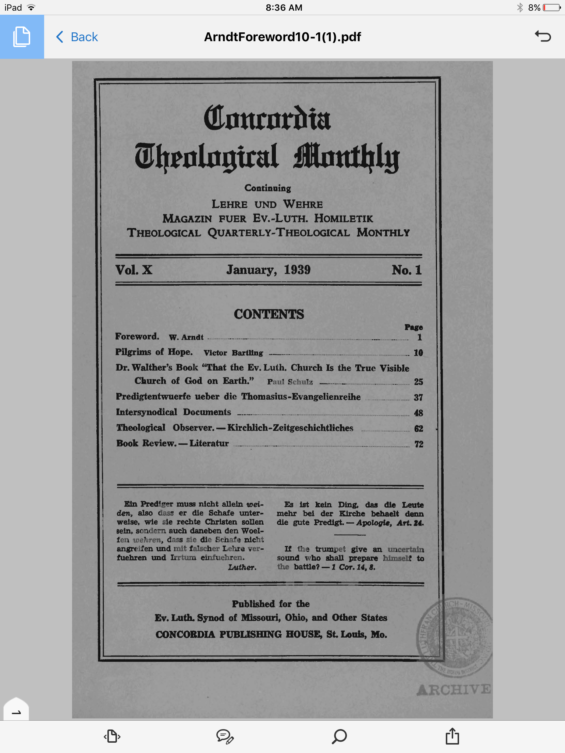In 1939 the Theological Journal Lehre und Wehre became, as I understand it, Concordia Theological Monthly. That was a long time ago and even journals today wonder if they can survive, or should, a theologian by the name of Arndt gave a compelling reason for that journal at that time. Almost 80 tears have gone and nothing has changed –
The remark is heard on all sides that we are living in stirring times, that epochal events are happening in quick succession, that many pillars of the old order are crashing to the ground and great fundamental changes are introduced. In breath-less amazement, often mingled with undisguised terror, the inhabitants of the world observe the upheavals going on in the social and political sphere, and many do not conceal their feeling that humanity is, as it were, sitting on a vast powder-keg with ominous sparks dancing about, threatening any minute to cause a cataclysmic, all-destructive blast. It is not our intention here to discuss Communism, Naziism, Fascism, the bitter struggle between capital and labor, the scrapping of the traditional economic system under which our Republic developed and became strong; the evident ascendancy of Socialism, the existence of want and famine in the midst of more abundant crops than can be consumed, the lure of schemes promising happiness and security without toil by a sort of financial magic, the confusion and bewilderment pertaining to educational aims and objectives, and other topics of a politico-social nature which at present absorb much of the attention of thinking people. Let the journals whose editors and contributors have expert knowledge in these fields address themselves to the task of analyzing and solving the numerous problems of a secular nature which make our vaunted civilization and twentieth-century enlightenment appear as a huge ironical question-mark. What this journal is legitimately concerned with is the religious scene and its various movements and developments. Here, too, the observer will notice vast changes, affecting deeply the work of the Church in its many ramifications, the theology of the schools, of the pulpit, and of the religious press and whatever other channels there are in which religious thought and conviction find expression. Naturally we are here thinking not of religion in general, inclusive of Mohammedanism, Shintoism, Buddhism, and Judaism, but of the Christian religion.


